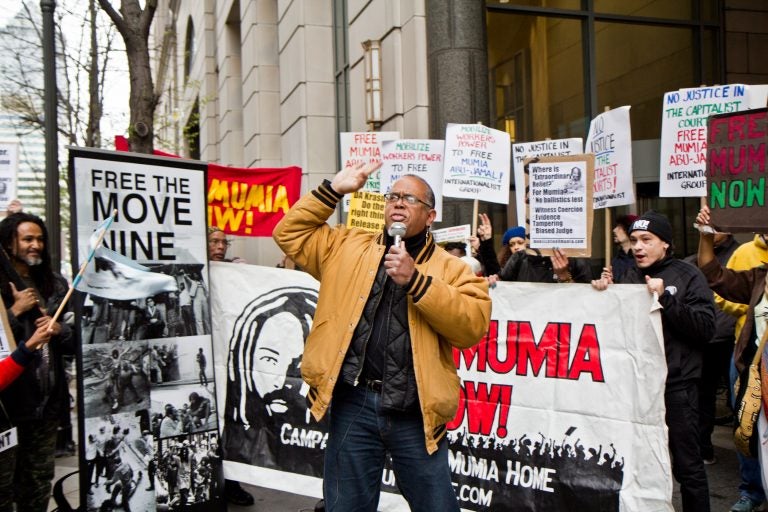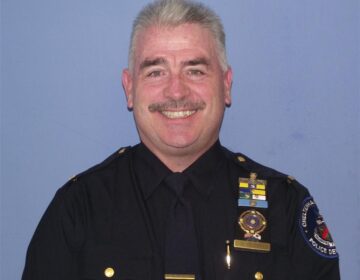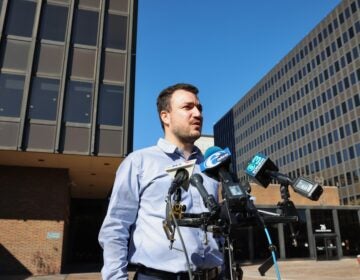Recent U.S. Supreme Court ruling could be opening for Mumia Abu-Jamal appeal
Abu-Jamal, a former journalist and member of the Black Panther Party, was found guilty of killing Philadelphia Police Officer Danial Faulkner in December 1981.

Zayid Muhammad leads a rally for the release of Mumia Abu-Jamal outside the Philadelphia Criminal Justice Center Monday morning. (Kimberly Paynter/WHYY)
Found guilty of killing a Philadelphia police officer nearly four decades ago, Mumia Abu-Jamal is continuing efforts to appeal that 1982 conviction. His defense lawyers argued Monday morning in Philadelphia Court of Common Pleas that Abu-Jamal’s rights were violated during a previous appeal due to a conflict of interest on the part of Ron Castile, former chief justice of the Pennsylvania Supreme Court.
Abu-Jamal, a former journalist and member of the Black Panther Party, was found guilty of killing Officer Daniel Faulkner in December 1981. Abu-Jamal was not at Monday’s hearing, but Faulkner’s widow and family members attended.
Judge Leon Tucker had asked the Philadelphia district attorney’s office to produce an internal memo that might show Castille — back when he was city district attorney — had direct involvement in pursuing Abu-Jamal’s death sentence. If he did, his later denial as Supreme Court justice of Abu-Jamal’s appeal, could be deemed biased.
The district attorney’s office told Tucker there is no memo or document showing a personal bias.
“We had a legal assistant full time on that project for the last 63 days,” said Nancy Winkelman, head of the district attorney’s law division. “He searched high and low — through digital files, through boxes, through files in Harrisburg — anything possible that might show Ron Castille’s personal involvement in this case.”
This is the hearing involving Abu-Jamal under the watch of newly elected Philadelphia District Attorney Larry Krasner, who campaigned to reform the office by creating a more a racially just conviction rate.
In this case, however, the district attorney’s office is not budging.
“We don’t find evidence of a direct personal connection by Ron Castille to this case,” said Winkelman.
Tucker continued the hearing until Aug. 30.
The latest legal salvo was triggered by a 2015 U.S. Supreme Court decision that found Castille’s decision to deny an appeal by convicted Philadelphia killer Terrance Williams was unlawful. As district attorney, Castille pushed for the death penalty for Williams. Later, as a state Supreme Court justice, he denied his appeal.
Krasner’s office said that, while there may have been bias in the Williams case, Abu-Jamal’s case involves a different set of circumstances. Castille was, indeed, the district attorney at the time, but he did not have a direct hand in pushing for the death penalty against Abu-Jamal Krasner’s team said.
Attorneys for Abu-Jamal say there is evidence that could prove otherwise. They insist an internal memo, written by Castille as district attorney, might show his involvement with seeking the death penalty.
“When Castille was on the Supreme Court and did not recuse himself, as asked by the defense, it was not an unbiased judiciary,” said attorney Julie Ritter. “The U.S. Supreme Court in Commonwealth vs. Williams set a new standard about what it means to have a lack of due process.”
Daniel Faulkner’s widow, Maureen Faulkner, flew in from California, where she now resides, to attend the hearing with her current husband, Paul Palkovic.
“It’s exhausting. It’s been 37 years,” she said. “I believe the district attorney did stand up and do the right thing by arguing the case. We will have to argue the case again in August. Mumia Abu-Jamal will never, never be freed.”
As demonstrators gathered outside the courthouse in Philadelphia Center City, calling for Abu-Jamal’s liberation (“Brick by brick, wall by wall, free Mumia Abu Jamal”) attorneys inside were not arguing for his innocence, but rather the legitimacy of his appeals.
“The missing memo is related to a much broader principle, ensuring that the rule of law is properly followed,” said attorney Samuel Spital. “When Mr. Abu-Jamal had a post-conviction appeal heard by Justice Castille, this was the same person who, as DA, oversaw the direct appeal process and played a role in prosecuting Mr. Abu-Jamal. The Supreme Court said that is unacceptable.”
WHYY is your source for fact-based, in-depth journalism and information. As a nonprofit organization, we rely on financial support from readers like you. Please give today.





